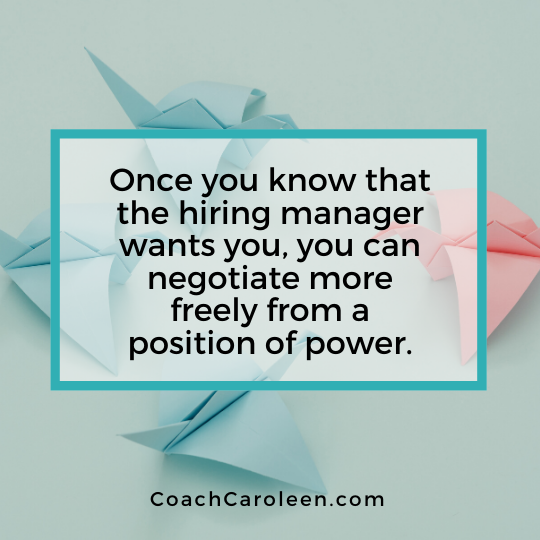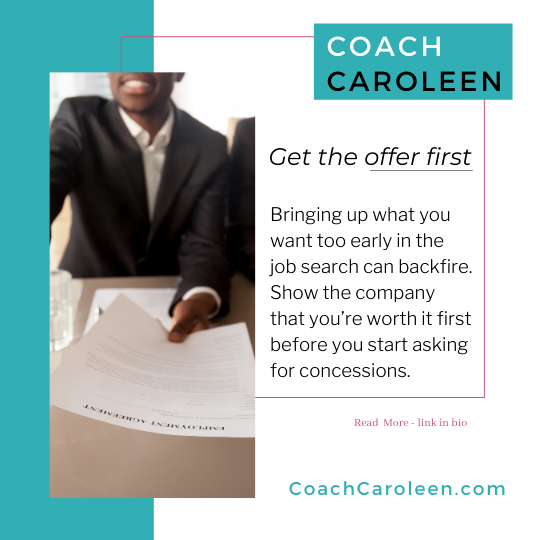Additional menu
Have you negotiated salary before you got the offer?
Have you asked about job flexibility with the recruiter?
Have you shared your vacation plans before the final interview?
These are all examples of discussing the wrong information with the wrong people at the wrong time. When you’re job hunting, you will interact with different people at various stages in the job search. It’s key to share the right information with the right person at the right time.
Working with Recruiters
If your targeted resume gets you past the Applicant Tracking System (ATS), usually the first person you speak with is the recruiter. I’ve found that most recruiters ask the same series of questions. In the job search, the recruiter needs you just as much as you need them but remember, the recruiter doesn’t work for you.
When working with the recruiter, be honest but don’t tell everything upfront. Only share the minimum information needed based on where you are in the job search process. Although you want to maintain open communication, it doesn’t mean you show all of your cards to the recruiter. Again, the recruiter doesn’t work for you.
Salary
Often recruiters will try to get your salary requirements right out of the gate. First, for many job seekers, this catches them off guard and they get flustered. The recruiters are hoping to catch you in a moment of panic. They hope you’ll throw out something low in fear of overpricing yourself.
Once you share a number, you’ll also feel artificially anchored to it. Second, and the real reason, is that the recruiter just wants to know if you’re in the right ballpark for salary. The recruiter probably knows the salary range of the role. If you’re not even close or you want too much, the recruiter doesn’t want to waste their time on you.
Here are a few scripts that have worked for me to push back on recruiters wanting to know salary requirements too early in the job search process:
My salary requirements are based on the role. If we find an opportunity that is a good fit, we can discuss salary in more detail then. << If you don’t have a particular job opening, then this works well. After all, should a pizza delivery person get paid the same as a neurosurgeon?
I’m not ready to discuss salary at this stage. I’d like to learn more about the opportunity. If we decide that I’m a good fit and you’ll be submitting my resume to the hiring manager, then we can discuss salary. << Here we have a particular opportunity but you’re not even sure you’re considered a candidate. Why reveal your salary requirements if the recruiter isn’t even passing you onto the hiring manager?
If you’re concerned that my salary requirements are too high, why don’t you share the salary range for this opening and I’ll let you know if this is acceptable. << Yes, this has worked for me in real life! Believe it or not, sometimes you just need to ask.
If the recruiter keeps pushing, they may just want to know which jobs they should send your way. If you are at a stage in your career where you do have a minimum salary requirement, then you can share that like this.
At this stage in my career, I’m only considering opportunities that pay at least xx. Of course, we can address the salary in more detail based on the particular opportunity. << This saves both you and the recruiter time if you know you’re not willing to entertain opportunities under a certain threshold. Yet it still leaves the door open for you to negotiate based on the role.
Location
Where are you willing to work and are you open to relocating? I live in a big city and there are certain areas of town where I’d prefer to avoid for traffic reasons. I’m also not willing to relocate so I make that clear. If you’re open to relocation and travel, share this with your recruiter so they can present those opportunities.
Job role
What job do you want? If a recruiter is representing a particular job opening, then this question won’t come into play. If the recruiter is third-party and may represent various jobs, it’s good to share other roles you would consider.
Are you open to contract work?
Contract work is a short-term limited engagement. With third-party recruiters from staffing agencies, you may be working on a limited contract as an employer of the staffing agency. Let your recruiter know if this is something you would consider.
Pros of contract work include that it’s good for those transitioning careers. It’s a way to get your foot in the door like I did when I transitioned to banking. Companies aren’t as discerning since they know you’re only there temporarily. It’s also good for people that don’t want the commitment of working on the same project for years on end. I know contractors who deliberately only work contract work so they can enjoy a built-in six-month cool off period in between contracts.
The cons of contract work are you don’t always get the best benefits. Being permanent at a company has a bit more longevity although no job is guaranteed anymore. However, with contract work, you know there’s a hard stop and you’ll have to leave unless you convert over to a permanent FTE role.
The reason companies love contractors is because they get to try it before they buy it. Plus, companies can cut you easily without any fanfare or much HR paperwork. Contractors are a great way for companies to augment staff as needed quickly without too much permanent overhead.
What not to ask recruiters
Recruiters are connecting candidates to hiring managers. Save yourself time and frustration. Don’t ask about things the recruiter can’t control or promise like upcoming vacation time or flexibility on the job.
Unless the recruiter is specific to a team or hiring manager, it’s unlikely that the recruiter is a Subject Matter Expert (SME) on the actual role. It’s doubtful that your recruiter knows the day-to-day tasks and nitty gritty details of what you’ll be doing. Save those questions for the hiring manager and if you get to meet the team.
Also, don’t ask your recruiter about job flexibility or vacation time either. Once you’re hired, it’s your manager who will manage those details. Even if the recruiter promises that you can leave early on Thursdays for your kid’s soccer games, ultimately your manager will make that decision, not the recruiter.
If you haven’t gotten the job offer yet, please do not negotiate salary with the recruiter. Once you get the offer, then the recruiter will function as the go-between you and the hiring manager. At that stage, when you negotiate, although you may be talking with the recruiter, it’s the hiring manager to make the final decision. Don’t negotiate salary until you know they want you (and that you want to work there too!). Once the company has made an offer, you’ll know the hiring manager wants you. From there, you’ll be negotiating from a much better place of power.

Interviewing with the Hiring Manager
Congratulations! If you’re talking to the hiring manager then that means you’ve gotten an official interview. At this stage, the door is opening for a new series of questions. Remember the interview is a two-way street. The company is checking if you’ll be a good fit and you, as the job seeker, is checking if you want to work there. At this stage, it’s fair game to discuss the role and your expected responsibilities.
In these early interviews, the focus should be on what value you can bring to the role, team, and company. If you have a panel interview (more than one person), focus on how you can support the team and work well with others. The people on the panel may be a mix of managers and peers. It’s good to show how you’re a team player.
If the company is wanting to sell you on working there, they may want to discuss their benefits and advantages of this role and company. In that case, you’re welcome to inquire about benefits in response to the conversations they started. Otherwise, it’s best to hold off on conversations about what the company can do for you until you’re sure they want you : ) Bringing up what you want too early in job search conversations can backfire. Show the company that you’re worth it first before you start asking for concessions.
After You Get the Offer
Now really, big congratulations! Getting the job offer is the whole goal of the job search. Now you can negotiate salary from a position of power. The hiring manager has selected you from a pool of candidates and now they want you to join the team.
At this stage, you may be working with the recruiter again. As mentioned above, although you may be interacting with the recruiter, it’s the hiring manager who will ultimately make the decisions in the background. This is the time to negotiate salary and ask questions about benefits. If the hiring manager really wants you, s/he will be upset if the recruiter jeopardizes your acceptance. The hiring manager spent a lot of time and effort finding you. They don’t want to lose you now! Keep that in mind if the recruiter pushes back on a request. Simply ask to escalate the request to the hiring manager each time.
If you have upcoming vacations or need some particular job flexibility, now is the time to bring it up. After you’ve gotten the offer, you’re almost part of the team so it’s expected that you share this information as it could impact others. Now you can shift the focus slightly back to, what can the company do for me? You’ve proven yourself to be a valuable candidate which is why they extended you an offer.

Summary
During the job search process, it’s key to share the right information with the right person at the right time.
When you’re working with the recruiter, share just enough so that they know what type of jobs you want, where you’re willing to work, and if you’re willing to do contract work. If you’re at a stage in your career where you won’t work for less than a certain amount, you can share that with the caveat that you’re still planning on negotiating based on the role.
Once you’ve gotten an interview with the hiring manager and/or panel interview, focus on what value you can bring to the role, team, and company. At this stage, it should be about what you can do for them, not what they can do for you.
If you’ve secured an offer – congratulations! Now, it’s time to negotiate salary and dig more into benefits. Once you know that the hiring manager wants you, you can negotiate more freely from a position of power. Now the conversation can shift more to what can the company do for you. Bring up any upcoming vacations and discuss job flexibility if needed.
